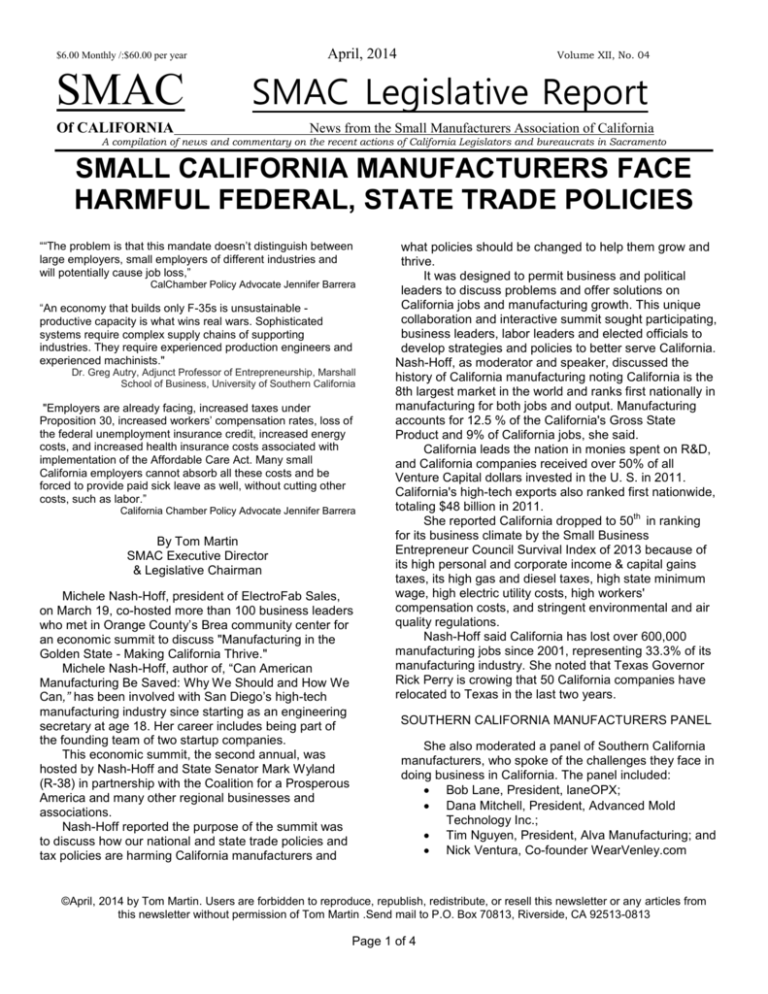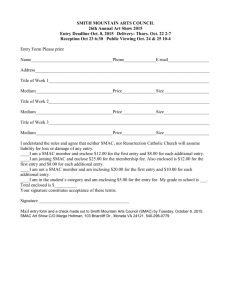SMA Monthly Newsletter: Small California Manufacturers Face
advertisement

April, 2014 $6.00 Monthly /:$60.00 per year SMAC Volume XII, No. 04 SMAC Legislative Report Of CALIFORNIA News from the Small Manufacturers Association of California A compilation of news and commentary on the recent actions of California Legislators and bureaucrats in Sacramento SMALL CALIFORNIA MANUFACTURERS FACE HARMFUL FEDERAL, STATE TRADE POLICIES ““The problem is that this mandate doesn’t distinguish between large employers, small employers of different industries and will potentially cause job loss,” CalChamber Policy Advocate Jennifer Barrera “An economy that builds only F-35s is unsustainable productive capacity is what wins real wars. Sophisticated systems require complex supply chains of supporting industries. They require experienced production engineers and experienced machinists." Dr. Greg Autry, Adjunct Professor of Entrepreneurship, Marshall School of Business, University of Southern California "Employers are already facing, increased taxes under Proposition 30, increased workers’ compensation rates, loss of the federal unemployment insurance credit, increased energy costs, and increased health insurance costs associated with implementation of the Affordable Care Act. Many small California employers cannot absorb all these costs and be forced to provide paid sick leave as well, without cutting other costs, such as labor.” California Chamber Policy Advocate Jennifer Barrera By Tom Martin SMAC Executive Director & Legislative Chairman Michele Nash-Hoff, president of ElectroFab Sales, on March 19, co-hosted more than 100 business leaders who met in Orange County’s Brea community center for an economic summit to discuss "Manufacturing in the Golden State - Making California Thrive." Michele Nash-Hoff, author of, “Can American Manufacturing Be Saved: Why We Should and How We Can,” has been involved with San Diego’s high-tech manufacturing industry since starting as an engineering secretary at age 18. Her career includes being part of the founding team of two startup companies. This economic summit, the second annual, was hosted by Nash-Hoff and State Senator Mark Wyland (R-38) in partnership with the Coalition for a Prosperous America and many other regional businesses and associations. Nash-Hoff reported the purpose of the summit was to discuss how our national and state trade policies and tax policies are harming California manufacturers and what policies should be changed to help them grow and thrive. It was designed to permit business and political leaders to discuss problems and offer solutions on California jobs and manufacturing growth. This unique collaboration and interactive summit sought participating, business leaders, labor leaders and elected officials to develop strategies and policies to better serve California. Nash-Hoff, as moderator and speaker, discussed the history of California manufacturing noting California is the 8th largest market in the world and ranks first nationally in manufacturing for both jobs and output. Manufacturing accounts for 12.5 % of the California's Gross State Product and 9% of California jobs, she said. California leads the nation in monies spent on R&D, and California companies received over 50% of all Venture Capital dollars invested in the U. S. in 2011. California's high-tech exports also ranked first nationwide, totaling $48 billion in 2011. th She reported California dropped to 50 in ranking for its business climate by the Small Business Entrepreneur Council Survival Index of 2013 because of its high personal and corporate income & capital gains taxes, its high gas and diesel taxes, high state minimum wage, high electric utility costs, high workers' compensation costs, and stringent environmental and air quality regulations. Nash-Hoff said California has lost over 600,000 manufacturing jobs since 2001, representing 33.3% of its manufacturing industry. She noted that Texas Governor Rick Perry is crowing that 50 California companies have relocated to Texas in the last two years. SOUTHERN CALIFORNIA MANUFACTURERS PANEL She also moderated a panel of Southern California manufacturers, who spoke of the challenges they face in doing business in California. The panel included: Bob Lane, President, laneOPX; Dana Mitchell, President, Advanced Mold Technology Inc.; Tim Nguyen, President, Alva Manufacturing; and Nick Ventura, Co-founder WearVenley.com ©April, 2014 by Tom Martin. Users are forbidden to reproduce, republish, redistribute, or resell this newsletter or any articles from this newsletter without permission of Tom Martin .Send mail to P.O. Box 70813, Riverside, CA 92513-0813 Page 1 of 4 SMAC Legislative Report Mitchell, Nguyen, and Ventura highlighted the difficulties in finding skilled qualified workers, while competing against Chinese prices held artificially low through currency manipulation. Dr. Greg Autry, Adjunct Professor of Entrepreneurship, Marshall School of Business, University of Southern California, led off the national panel with the topic of "Currency Valuation and National Security Concerns with the Current U.S. Trade Regime." Echoing the earlier panel comments Autry also discussed the currency manipulation of China, showing how China's currency manipulation directly affects our national security. While China has adjusted the valuation of their renminbi (yuan) slightly since they drastically devalued it in 1994, it has still not returned to that level. To keep their currency valuation low, Dr. Autry said they either keep the dollars they get from their trade surplus in reserve or buy U. S. Treasury bonds. The dollars they earn from our trade imbalance and the interest they earn from buying our debt in the form of bonds has funded the dramatic buildup of their military. Dr. Autry said our technical superiority in military systems will not assure our national security any more than the technical superiority of Nazi Germany's aircraft and tanks did for them. Economic superiority is what matters. The manufacturing industry of the U. S. out produced Germany during WWII and the Soviet Union in the Cold War, he said. Dr. Autry stated, "An economy that builds only F-35s is unsustainable - productive capacity is what wins real wars. Sophisticated systems require complex supply chains of supporting industries. They require experienced production engineers and experienced machinists." U.S. MILITARY CANNOT RELY ON CHINA OR RUSSIA He concluded that we cannot rely on China to produce what we need for our military and our defense systems, and we should not be relying on Russia's Mr. Putin to launch our satellites and space vehicles and provide us a seat to get to the international space station. , Michael Stumo, CEO of the Coalition for a Prosperous America, questioned "Can Consumption Taxes Create Jobs and Help Regain American Prosperity?" He said, "America has no strategy to win in terms of being a successful producing and exporting nation. Growing exports, expanding two-way trade, and establishing global supply chains makes us losers. Unilateral trade disarmament makes us losers. We should want to win and not be ashamed of pursuing our national interest, he said. " Stumo said a consumption tax could reduce our income tax burden, include imports in our tax base, shrink the trade deficit, and increase U.S. production while maintaining progressivity. He pointed out that our national Gross Domestic Product (GDP) equals Consumption plus Investment plus Government Procurement plus Net Exports (Total exports minus Total Imports). Because our imports exceed exports, our economy is smaller than it would be if the U.S. had balanced trade. Stumo said more than 150 countries have a form of consumption tax, either a goods and services tax (GST) or a value added tax (VAT), with an average 17% level. These countries rebate these taxes on their exports, which is a subsidy. The taxes are "border adjustable" because they act as a 17% tariff on our goods sent to other countries. After NAFTA, Mexico replaced its tariff reduction by establishing a 15% VAT, and Central America did the same, establishing a 12% VAT after CAFTA. Other countries use consumption taxes to offset income, payroll, or other employer taxes to help their manufacturers be more competitive in the global marketplace or to offset other costs like national health care or pension programs. These border adjustable consumption taxes have increased our trade deficits with our trading partners, to $471.5 billion in 2013, $318 billion with China alone. CPA advocates changes in U. S. trade policy to address this unfairness which tremendously distorts trade flows. Stumo said the goal of a U. S. consumption tax should be: Neutralize foreign tax (tariff/subsidy) advantage; Reduce non-border adjustable taxes: Income and/or Payroll; Replace them with border adjustable consumption taxes like a GST; revenue neutral; distribution/progressivity neutral; and Minimize fight over exemptions, deductions, and location of profits CALIFORNIANS HOLD 25% OF ALL PATENTS Another speaker, Pat Choate (Economist; Author, Saving Capitalism: Keeping America Strong) covered the importance of protecting Intellectual Property to the future of American manufacturing. He said that the U. S. is the most innovative country in the world, issuing more patents than any other country, and Californians hold 25% of all U. S. patents. Choate highlighted how our current trade policies do not address patent infringement, trademark counterfeiting, and the outright theft of our trade secrets by China and other Asian countries. The intellectual © April, 2014 by Tom Martin. Users are forbidden to reproduce, republish, redistribute, or resell this newsletter or any Articles from this newsletter without permission of Tom Martin .Send mail to P.O. Box 70813, Riverside, CA 92513-0813 Page 2 of 4 SMAC Legislative Report property clauses of the Trans-Pacific Partnership would exacerbate the problems already created by the passage of the America Invents Act in 2012 converting the U. S. from a "first-to-invent" to "first-to-file" that has hurt our innovation. Any future trade agreement must address intellectual property theft. The next speaker, Teamsters Legislative Representative Mike Dolan, has long experience working for Fair Trade (fighting expansion of the jobkilling NAFTA/WTO model). He said if we build and maintain a strong bipartisan mobilization, we can stop Fast Track trade authority from being granted to the President and stop the TransPacific Partnership (TPP) and the Transatlantic Trade and Investment Partnership (TTIP) Agreements from being passed. Dolan called the pending TPP "NAFTA on steroids" and said that TTIP is just as bad. Dolan concluded that the path to victory on sensible trade policy requires efforts by the Coalition for a Prosperous America and the constituencies it represents -- small business, HOTELS, LODGING PHONE SYSTEMS INADEQUATE FOR EMERGENCY CALLS Tens of thousands of hotels don't allow guests to directly reach emergency services when they dial 911, according to a national survey taken after a 9-year-old girl couldn't call for help while her mother was being stabbed to death in a Texas motel, according to a report written by Associated Press Reporter Nomaan Merchant. The murder of Kari Hunt Dunn spurred a petition that has garnered more than 440,000 signatures demanding hotels and motels be required to enable the direct dialing of 911. Many hotels require callers to dial "9" before 911 or have some other system, such as calling first to the front desk, which advocates say can lead to panic and confusion in an emergency. The petition got the attention of Federal Communications Commission member Ajit Pai, whose office announced the results of a survey done after Dunn's death by the American Hotel & Lodging Association. The industry group found that only about 45 percent of franchised hotels and motels and 32 percent of independent hotels have direct 911 dialing. Independent owners and franchisees comprise the "vast majority" of the estimated 53,000 such properties in the U.S., including hotels using a brand name, Pai said. Dunn's estranged husband, Brad Dunn, is accused of stabbing his wife during a visit with their three young children in December 2013. Police said the family was in a motel room at the Baymont Inn in Marshall, Texas, when he attacked his wife in the bathroom. Their 9-year-old daughter ran to the phone and tried to call 911 — four times — but she couldn't get through. The girl eventually ran into a hallway and found someone in an adjacent room who could call 911. The hotel is operated by a franchisee, though Wyndham Hotel Group owns the Baymont brand name. Kari Hunt Dunn's father, Hank Hunt, started the online petition for what he called "Kari's Law," asking that federal government require hotels and motels to use "8" as a prefix to dial an outside line instead of "9." The change.org petition had nearly 441,300 signatures as of Tuesday morning. "It's very, very encouraging," Hunt said Monday. "The number of people that seem to be taking an interest in getting this done is increasing at a rate that we weren't expecting." KNOW THE LAW MANUFACTURERS FACE SPECIFIC LEGAL LIMITS ON EMPLOYING TEENAGE MINORS Almost all minors under the age of 18 are subject to California's child labor protections. Under the California Labor Code, "minor" is defined as any person under the age of 18 years required to attend school under the provisions of the Education Code, and any person under age six. "Dropouts" are subject to California's compulsory education laws, and thus are subject to all state child labor law requirements. Emancipated minors, while subject to all California's child labor laws, may apply for a work permit without their parents' permission. Concerning employment in Manufacturing and Processing the California Labor Code states sixteen (16) is the minimum age that minors may be employed in California unless minors under that age are expressly permitted by law to work: “NO MINOR UNDER THE AGE OF 16 YEARS SHALL BE EMPLOYED, PERMITTED, OR SUFFERED TO WORK (their emphasis) in or in connection with any manufacturing establishment OR OTHER PLACE OF LABOR OR EMPLOYMENT AT ANY TIME, except as may be provided in this article (namely, LC Sections 1285 -1312) or by the provisions of Part 27 of the Education Code [EC 48000 et seq.] [LC 1290] (Emphasis added).” Under state law 16 is the minimum age that minors may be employed, permitted or suffered to work in or in connection with any manufacturing establishment. [LC 1290] “Manufacturing” includes work done at any place upon the work of a manufacturing establishment or upon the materials entering into the products of a manufacturing establishment whether directly under any arrangement with the person in charge of the © April, 2014 by Tom Martin. Users are forbidden to reproduce, republish, redistribute, or resell this newsletter or any Articles from this newsletter without permission of Tom Martin .Send mail to P.O. Box 70813, Riverside, CA 92513-0813 Page 3 of 4 SMAC Legislative Report establishment or indirectly through contractors of third persons. [LC 1291] Under federal regulation, adopted by inclusion by the state of California, 16 is the minimum age for employment in manufacturing and processing occupations [LC 1290]. Minors under 16 may not be employed in manufacturing or processing in any occupation performed in the work rooms or work places where goods are manufactured or processed, including occupations that would otherwise be permitted to 14 and 15 year olds. [LC 1294.1, 29 CFR 570.33 (a) and 570.34 (b)] Processing occupations include for example, filleting fish, dressing poultry, cracking nuts, commercial laundering, and dry cleaning (except in a retail, food service or gasoline service establishment in those occupations expressly permitted and listed in Chapter 7 or this digest). Goods may only be manufactured or assembled in the home by youths when both the employee and employer have special permits issued by the Labor Commissioner which allows industrial homework. [LC. 2658 & 2659] A person must be at least 16 years of age to be issued a home worker permit. [LC 2661] WORKERS’ COMP: PREDESIGNATION OF PHYSICIAN REGULATIONS APPROVED The Office of Administrative Law (OAL) approved changes to the workers’ compensation regulations concerning Pre-designation of Personal Physicians and Reporting Duties of the Primary Treating Physician. The final regulations will take effect on July 1, 2014. These regulations conform to workers’ compensation reform legislation (SB 863) which was passed in 2012. Although some of the provisions of SB 863 took effect January 1, 2013, many of the law’s provisions required administrative/regulatory action before implementation. SB 863 made substantive changes with respect to the way that medical treatment is provided and paid for when an employee sustains a work related injury. According to the Department of Industrial Relations, the final regulations change the criteria that an employee must meet to predesignate a personal physician or medical group for work-related injuries or illnesses to conform to SB 863. The regulations also interpret and clarify what is meant by “chiropractic visits” under Labor Code section 4604.5 and limit the number of chiropractic visits an injured worker may have unless a specific exception applies. In addition, the regulations revise the method for an employee to designate a personal physician to provide him/her with treatment in case of a medical injury. The regulations provide for two new forms for pre- designating a personal physician or a personal chiropractor. ASSEMBLY COMMITTEE OKs MANDATORY THREE DAYS PAID SICK LEAVE MANDATE The Assembly Labor and Employment Committee has approved a California Chamber of Commerce designated “job killer” bill AB 1522 (Gonzales; D-San Diego) requiring employers to provide their employees with mandatory, protected, paid sick leave, according to a California Chamber of Commerce report. “The problem is that this mandate doesn’t distinguish between large employers or small employers of different industries and will potentially cause job loss,” CalChamber Policy Advocate Jennifer Barrera told the committee. “While a large employer very well may be able to absorb this cost, and probably already does provide their employees with paid sick leave, a small employer may not and may be detrimentally impacted by this mandate.” AB 1522 mandates that all employers, except those with collective bargaining agreements, provide any employee who has worked in California for seven days with paid sick leave, at an accrual rate of one hour for every 30 hours worked. In July 2014, employers in California are already facing a significant cost increase due to the $1 increase in minimum wage that will take effect. This $1 increase is in addition to the cumulative impact of other cost hikes employers are already facing, including increased taxes under Proposition 30, increased workers’ compensation rates, loss of the federal unemployment insurance credit, increased energy costs, and increased health insurance costs associated with implementation of the Affordable Care Act. Many small California employers cannot absorb all these costs and be forced to provide paid sick leave as well, without cutting other costs, such as labor, Barrera said. Thanks and a tip of the hat to: Associated Press Reporter Normaan Merchant California Chamber of Commerce Michele Nash-Hoff president ElectroFab Sales Coalition for a Prosperous America California, Dept of Labor Tom Martin can be reached at 951-353-0770 Or Tomforsmac2@gmail.com If emailing please list SMAC Newsletter in the subject line © April, 2014 by Tom Martin. Users are forbidden to reproduce, republish, redistribute, or resell this newsletter or any Articles from this newsletter without permission of Tom Martin .Send mail to P.O. Box 70813, Riverside, CA 92513-0813 Page 4 of 4






